THE PRIMATE
PROTECTORS
HELPING GIBBONS TO HELP THEMSELVES
by

Leonie and Pongsagdi Vejjajiva have 72 gibbons in their back yard, 72, count em!! They are wonderful gibbons. They are cute and cuddly gibbons. They are loud gibbons, but most important of all- they are living gibbons!! If not for the work of the Vejjajivas and their organisation, the Wild Animal Rescue Foundation of Thailand (WAR), many of these gibbons would be dead today.
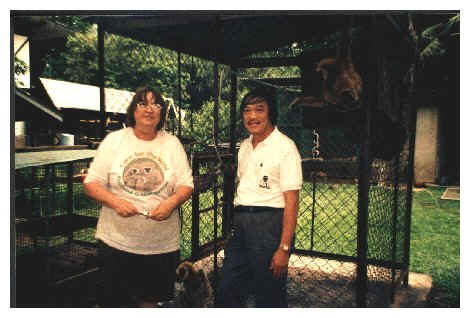
Leonie and Pongsagdi Vejjajiva
In a recent crackdown on a racket using baby gibbons for photos the International Primate Protection League (IPPL) reported that,"Three baby white-handed gibbons, one baby pileated gibbon and one tiny infant crab-eating macaque were rescued from Pattaya. They were sent to the rescue centre operated by WAR.
"On arrival at the sanctuary, the baby primates were given a check-up by the foundation veterinarian. They were all described as malnourished, suffering from mineral and vitamin deficiencies, intestinal worms, and colds. One gibbon had a finger missing and one had all his teeth pulled out.
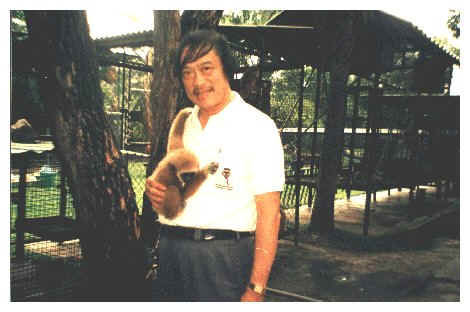
Pongsagdi Vejjajiva with a gibbon monkey
"When the primates first arrived, it was noticed that their natural sleep patterns had been disrupted to keep them awake deep into the night when they are used for photography. Normally a gibbon goes to sleep at sunset and dosen't wake up again until dawn.
"Because of their listless behaviour, it was suspected that one of the baby gibbons was addicted to caffeine. This was confirmed when she saw someone drinking coffee: she screamed loudly until she was given some. Afterwards this behaviour changed and her appetite returned. She has now been weaned from this habit.
"All the animals are now recovering from their ordeal. When they are strong and healthy enough it is planned to send them to the Wild Animal Rescue Foundation's new sanctuary in Chachoengsao province, where it is hoped large cages can be built to house them until they are old enough to be considered for rehabilitation to the wild.
"Unfortunately, though, this photo racket still continues in Phuket in Southern Thailand. Here there are many baby gibbons tied to the beach bars where they are constantly tormented by the staff and drunken patrons".
The IPPL urges anyone concerned about baby gibbons to contact:
Khun Pong Leng-ee
Director, Royal Forestry Department
Phaholyothin Road
Bangkhen,
Bangkok,
Thailand
"Thank him for his efforts thus far and urge him to keep up his vigilance, especially regarding punishing the offenders and making sure that they cannot buy replacement animals".
Leonie says that some of the gibbons were so maltreated in Pattaya that they act like autistic children today with some of them continually banging their back up against their cage.
The Vejjajivas take care of three types of gibbons at their home, the white hand gibbon, the white cheeked gibbon (concolor) and the pileated gibbon. The gibbons' diet consists of vegetables and fruit (nothing that will give them diarrhea though like oranges or papayas). They also receive protein in the form of chicken liver and chicken meat and dried monkey chow.
The Vejjajiva's spend about Bt 60,000 a month looking after their animals. This includes food, medication, keepers' fees and the building and maintenance of cages. Their biggest expense is not the animal's eating habits, but their medical bills, which can be very expensive.
Leonie, 60 and Pongsagdi, 66 are grandparents now, but you would never know it by looking at them. They look fifteen years younger than they actually are. Their two children both have kids. Their daughter Joie, aged 38, is a schoolteacher here in Bangkok and has a daughter of 19. Their son Paul-Glyn, 40, is a stereo technician in Atlanta, Georgia. He has two daughters aged 15 and 5 & 1/2 and a son aged 13.
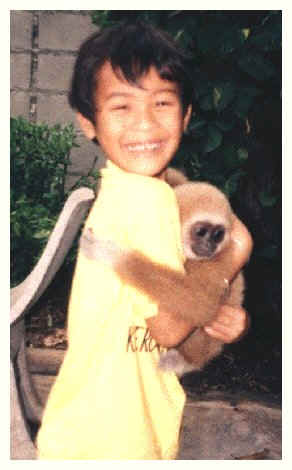
A young Thai girl has fun with
one of Leonie's gibbons
WAR was started in 1985 and presently is home to 72 gibbons. The organisation receives about 10% of its funding from abroad, but all the rest comes from here in Thailand. It is a Thai organisation. WAR is associated with and receives assistance from CARE FOR THE WILD in England. It has also been assisted by the International Primate Protection League in Summerville, South Carolina.
Leonie and Pongsagdi's odyssey to help gibbons began almost a decade ago, while they were shopping at Chatuchak market (the largest open air market in the world). Leonie said, "My eyes caught sight of a poor little baby monkey for sale, it was in a terrible state and dying". Leonie asked the dealer if she could take the gibbon home and nurse it back to health. He refused, so she bought the monkey, brought it home, nursed it back to health and that's how it all began.
Leonie is not one to back down from anyone. She says she won't go to Pattaya because she's scared she would strangle the photo touts if she saw them. Leonie says that in Pattaya, "The baby gibbons are taught to drink beer and do other things to entertain tourists. When they fall asleep, the animal trainers feed them with coffee to keep them awake at night so they can be photographed with people".
Some call Leonie the Gibbon Lady. The name dosen't bother her in the slightest. Mrs Vejjajiva is not scared to speak her mind and quite often she does so, much to the discomfort of some government and highly placed bureaucratic officials.
Pongsagdi says, "The fundamental objective of the Foundation is to take care of wild animals that are disabled, ill, maltreated and unwanted. If, after being in our care they produce offspring, it is hoped that with the help of experts in wild animal rehabilitation such offspring can be trained to live naturally in forests. We know of several cases where well meaning people released pet wild animals into the forest and most of the animals died or disappeared, and caused damage to the environment and to the fauna native to the forest."
WAR is currently working with the Forestry Department in building a wildlife sanctuary on 350 rai in Chachoengsao. They hope to move all the gibbons there within a few months. Once there, the gibbons will have much more space to move around. Four foreigners are currently volunteering their time at Chachoengsao; a civil engineer from Australia, an American computer expert and 2 animal experts from Great Britain and the U.S.A.
Leonie was finally recognised internationally for her work when she won the Global 500 Award. This award is presented by the United Nations Environment Program (UNEP) to select individuals worldwide who dedicate their lives to preserving the environment.
The President of UNEP Martin Holdgate said that, "The thread that binds the Global 500 laureates is practical achievements. Our members have taken action, have shown that commitment works and have tangible results to display for it." Leonie has a normal job too. She has worked as a paralegal for the law firm of Pilleck and Gibbings for the last 22 years. Pongsagdi used to work as an accountant, but now managing WAR is his full-time job.
A couple of examples of WAR's good works include;
-in 1989 the Royal Forestry Department confiscated 6 orangutans which were being illegally exported from Indonesia to Yugoslavia via Thailand. The centre took care of these baby orangutans for over 6 months, and they were later returned to Indonesia under the care of Dr Birute Galdikas, President of the Orangutan Foundation International.
-in 1991 the centre took care of three baby tigers that had been confiscated by the authorities from an animal dealer. It was suspected he was going to smuggle them to Taiwan, where they would have been eaten. They were only a month old and not yet weaned when they came to the centre. WAR took care of them for 6 months before sending them to the Forestry Department Wild Animal Breeding Centre in Khao Pratap Chang in Rajaburi.
Pongsagdi thinks that one of the biggest problems in Thailand today is that young people don't respect animals as much as they should, "When you walk down the street you see children kicking dogs everywhere". The kids learn this behaviour from their parents, but it must be broken if Thais are to truly respect their animals and wildlife.
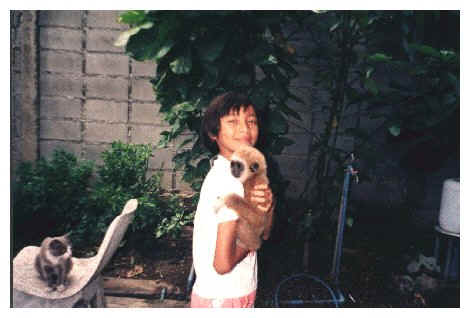
One of Leonie's 72 gibbons
Pongsagdi also says that monks and people living on temple grounds treat animals very poorly here in Thailand. People drop off animals at the temple thinking that they will be well cared for by the monks, but often the exact opposite occurs as the animals are maltreated.
The people in the temples usually don't have the faintest idea how to care for the animals, so many times they harm them accidentally. Many are put on short chains. They go crazy wanting more space and they start rubbing the chains into their skin. Some eventually embed the chains into their chest causing them tremendous discomfort. The lesson is clear, don't just drop an animal off at a Buddhist temple thinking that it will be cared for. Make sure that the people you are giving it to, know how to take care of animals.
The Vejjajivas have a waiting list of about 500 gibbons from all over Thailand. It's not stretching it to far to say that Leonie is the Jane Goodall or Dianne Fossey of Thailand. The animals are very rambunctious and they can make a lot of noise but the Vejjajivas say that the majority of their neighbours are very understanding.
Leonie played a pivotal role in having Miami animal dealer Matthew Block sentenced to 13 months in prison. Block was the lovely fellow responsible for the smuggling of 6 orangutans and 2 gibbons back in 1989. He hired a man named Curt Schaffer to smuggle the animals from Singapore through Bangkok and on to the former Yugoslavia. Leonie was paid by the American Government to travel to the U.S.A. to testify against Block and since that time she has received death threats.
The animals were discovered at Don Muang airport because they were in three crates marked birds. The custom officials became suspicious, because the crates were very heavy and the birds were making funny noises. They opened the crates and discovered the orangutans. They alerted the Forestry Department and the orangutans when then put in the care of the Vejjajivas.
If you desire any information about the organisation or you want to assist them financially please contact
Leonie or Pongsagdi Vejjajiva
c/o; Wild Animal Rescue Foundation of Thailand
29/2 Sukhumvit Rd.
Bangkok
Thailand
10110Telephone: 258-5560
Fax: 261-0925
Thailand needs more people like the Vejjajivas. Please help them anyway you can, for they are helping to preserve what's left of our beautiful environment. The Vejjajivas have a SPONSOR A GIBBON programme
The fines on the books now for having a protected or reserved species is 40,000 baht and/or up to 4 years in prison, but they are rarely enforced. The Vejjavivas are hoping that one day the T.S.P.C.A. (Thailand Society for the Prevention of Cruelty to Animals), of which Pongsagdi is the vice-president, will be a force to be reckoned with in Thailand. It should be!!
Unfortunately examples of animal abuse abound in Thailand. Take a trip to the Pata Zoo. Nice place- on the seventh floor of an shopping complex in downtown Bangkok is a gorilla, a polar bear, a Bengal tiger and a number of orangutans, just to name a few.
These animals look miserable, because they are miserable. A walk around the zoo will have you looking for explosive devices to blow up their cages so you can set them free. Pata has made a small fortune from refreshments, souvenirs and ticket sales off it's maltreatment of these animals.
Visit the pet section of Chatuchak Market on the week-end and ponder if you have ever seen animals in such close quarters. Granted some of the animals are well taken care of, but the majority are yearning for some space and some air to breathe.
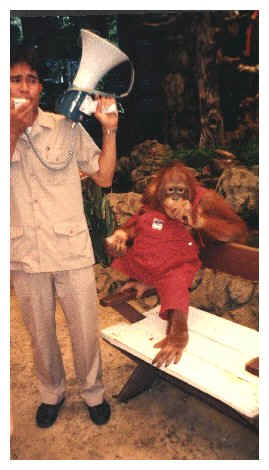
Animal abuse at the Pata zoo
The next time you see an animal maltreated on the street, stop and look around. Most people will either ignore it or probably laugh at the animal as if it dosen't have any feelings, WHY? It takes so little to be kinder and gentler to the creatures that make our planet a more interesting place to live in
Further Info:
Gibbon
Rehabilitation Project
About
the GRP
The
Gibbon Rehabilitation Project (GRP) is a research division of the Wild
Animal Rescue Foundation of Thailand (WAR). It was established in 1992 by
Khun Noppadol Preuksawan, the chief of the Royal Forest Department in Phuket,
and the Asian Wildlife Fund, with support from WAR. Terrence Dillon Morin
was also a driving force.
The
project's goal is to save gibbons and their rainforest habitat through
rehabilitation and education. Through its education program, it aims to
reduce poaching and deforestation, and gain support for its project and for
the conservation movement in Thailand. The GRP is an effective resource for
teaching the local community and foreign tourists, and it attracts
international students who wish to study gibbons. Gibbon conservation is not
a problem unique to Thailand, and what we learn here will be passed on to
other projects with similar aims.
Gibbons
are small, monogamous, territorial apes that live in the upper canopy of the
lowland rainforests of South-East Asia. These apes have a unique form of
locomotion - an arm to arm swinging movement called brachiation. Also unique
to gibbons are their loud territorial songs, which can be heard for several
kilometers in the rainforest. In the wild, gibbons feed mainly on fruit,
leaves, flowers and insects, and they can live for more than thirty years.
Thailand's
gibbons are threatened mainly by the destruction of the rainforests, but
they are also poached for meat, medicine and the lucrative pet trade. All
nine species of gibbon in South-East Asia are listed on Appendix 1 of the
Convention in International Trade in Endangered Species (CITES), and it has
been illegal to take a gibbon from the wild in Thailand since 1992. Sadly
though, this practice still continues because gibbons are very valuable,
both on local and international markets.
The
GRP works with white-handed gibbons (Hylobates lar); the most widespread of
the three species found in Thailand. Gibbon babies are acquired when their
mothers are shot, and they are then illegally sold as pets or for tourist
attractions. Sometimes they end up in bars, being taunted by tourists and
forced to drink whisky and smoke cigarettes. This solitary existence is a
far cry from the family life they would have in the wild. When gibbons reach
sexual maturity at six or seven years old they can become aggressive, and so
they are often dumped or killed. If they are kept, their canines are filed
down or removed, and the gibbons are kept in tiny cages or are chained up.
As a result of the illegal poaching, much of the rainforest in Thailand is
underpopulated with gibbons. The GRP works with the gibbons, which have come
from family homes and bars, in an effort to repopulate the rainforests where
gibbons once lived before they were poached to extinction.
When
a gibbon comes to the GRP it receives a medical check, including blood tests
for various diseases, and then undergoes a quarantine period. Before the
gibbons are ready for release, they are put through a long rehabilitation
program. This involves putting them through a series of environments, which
encourages their natural behaviors and provides them with the opportunity to
practice brachiating, eat natural foods, and have maximum contact with other
gibbons and minimum contact with humans. Juvenile gibbons are put together,
and adults are given the chance to form pairs. Large cages (at the GRP,
Phuket) and uninhabited islands in Phang-nga Bay are used as
`stepping-stones' for the gibbons, which are eventually released back into
the rainforest. Here, after a long acclimatization periods, the gibbons will
learn to survive by themselves. Continuous research is carried out to assess
the gibbons' development at each stage, and follow-up studies are done after
the release. Not all of the gibbons we get, meet the criteria for
rehabilitation program and some do not make it to the release stage. With
these animals, the GRP provides the best care we can.
The
GRP is currently funded to a large extent by donations from the public,
visiting its waterfall site, and from a volunteer program that it runs. The
volunteers make a donation to the GRP as well as giving their time and
energy and stay for a few months at a time - either improving their studies
or using their qualifications to help the project. The GRP constantly needs
money to provide cages, food, veterinary care and scientific equipment for
the project. People, companies and universities interested in sponsoring the
GRP, either with financial or equipment support are kindly invited to
contact the GRP with your proposal. Cash donations can be sent directly to
out account:
Wild
Animal Rescue Foundation of Thailand
A/C # 102-2-53754-3 - Thai Farmers Bank
Phuket, Thailand 83000
Gibbon
Rehabilitation Project
Bang Pae Waterfall, Pa Khlock,
Thalang, Phuket 83110 Thailand
Tel:
(66) 076-260492
Fax: (66) 076-260491
E-mail: gibbon@poboxes.com